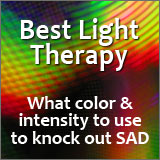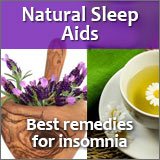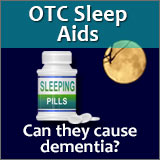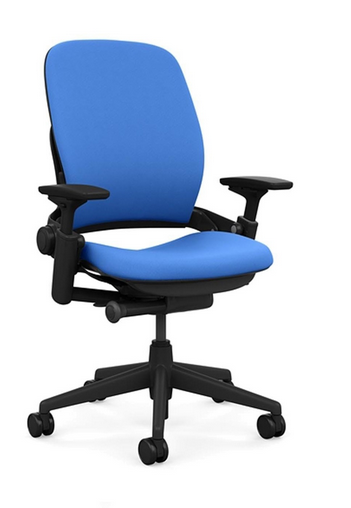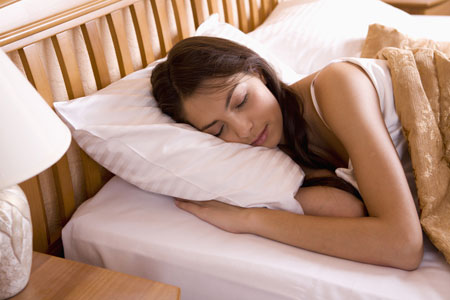Sleep Medications: 7 Pros and
12 Cons of Taking Them
Here's the good, bad, and ugly of taking sleep medications (prescription and over the counter).
7 pros of taking sleeping medications...
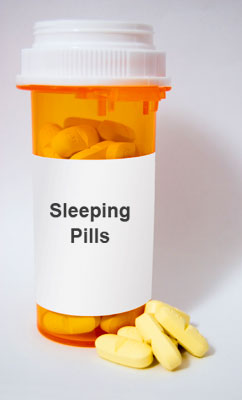
- Prescription sleeping medications work fast, they
are usually effective for falling asleep on the first night, and
involve no effort on the person who takes the pills. Just pop the pill
shortly before bedtime (follow label instructions exactly!).
- Use of prescription sleep medications can
provide benefits to severely sleep deprived people. They can help break
patterns of poor sleep, help them get some sleep relief, so they can
then work on the problems (medical or psychological) that are causing
their insomnia.
- Prescribed sleeping medications are now safer than they were back in the mid 1990s.
- For people who have trouble falling asleep
(sleep-onset insomnia), a new class of melatonin receptor agonist drugs,
called ramelteon, may not be as habit forming as other drugs.
- For people who wake up in the middle of the night
(called sleep maintenance insomnia),
there are now prescription drugs specifically to address this problem.
- Overdosing on sleeping pills is not as big a risk as it was with sleeping pills of the past.
- People with serious sleep disorders other than insomnia may benefit from skillful use of sleep medications administered by a sleep specialist.
What Does A Top Sleep Researcher Say About Sleep Medications?
- "WARNING:
Sleeping pills could be hazardous to your health or cause death from
cancer, heart disease, or other illnesses. This means that people who
take sleeping pills die sooner than people who do not use sleeping
pills.”
- “All sleeping pills produce immediate impairments of memory
and performance. Further, there is extensive evidence that sleeping
pills on average impair performance and memory on the following day.”
- “Sleeping pills turn off your brain cells.”
- “Sleeping pills tend to cause depression.”
Dr. Daniel Kripke, sleeping pill expert, and sleep researcher for over 30 years at the University of California, San Diego. From his book, The Dark Side of Sleeping Pills
12 cons of taking sleeping medications...
- Most experts recommend they should not be taken
for more than a few days to a few weeks (maximum). Why? Some sleep
medications can become habit forming (countless numbers of people have
become "accidentally addicted"). Sleeping medications known as
benzodiazepines are known to cause addiction. Also, long-term safety of
sleeping pills is not known and more studies are needed.
- Long term use is frequently ineffective for
lasting relief from insomnia. Long term use can also lead to tolerance
and the need for higher doses of the drugs. This can be especially true
for over the counter sleep aids (also called otc sleep aids), which is
why they should not be used for longer than a week.
- The quality of sleep for people who depend on
sleep medications is usually not satisfying. People may report only a
few days of decent sleep or perhaps just four or five hours of good
sleep at night.
- There can be problems with withdrawal when
the drugs are stopped. This can include agitation, anxiety, and insomnia
that's worse than when the drug was started. This is known as rebound
insomnia.
- The lasting harmful effects of sleeping pills
may not become apparent for many years. A 2003 study showed that older
women who were taking high doses of benzodiazepines had greater physical
decline over the years than women who did not take sleeping pills.
Researchers had been studying these women for years and the gist of
their findings was that the longer these women took the sleep
medications, and the higher the doses, the greater was the physical
decline of their bodies.
- Sleeping medication can interact negatively with other medications and alcohol.
There are possible risks for women who are pregnant or breastfeeding. People who have kidney or liver disease, respiratory problems, depression, or sleep apnea are also at risk.
Side effects of various sleep medications can include: dizziness, falling down for older adults, memory problems, morning hangover, daytime drowsiness, driving a car around town or eating while asleep and not remembering it, sleepwalking, headaches, suicidal thoughts, nausea, severe allergic reactions, and constipation.
According to several studies, regular use of prescription sleeping pills can increase the risk of skin cancer.
Over the counter sleep aids Over the counter sleep aids may cause restlessness because they contain antihistamines (the active ingredients are diphenhydramine and doxylamine). See my two articles below on the dangers of over the counter sleep aids.
Chronic use of some of the otc sleep aids can rapidly lead to dependency to the extent that a person can't sleep without taking these drugs. The main over the counter sleep aids are Benadryl, Nytol, Sominex, Nyquil, Advil PM, and Tylenol PM.
Doctors who prescribe sleeping medications may not be treating the underlying causes of sleeplessness. There may be depression or stress in a person's life that should be dealt with rather than masking it with sleep medications.
Here's a Natural, Non Prescription Sleep Aid for Healthy Sleep
If you're suffering from insomnia, stress, or wake up unrefreshed, I highly recommend this
advanced natural sleep remedy.
It can be used by adults and children 12 years and up. It sure beats taking potentially dangerous sleeping pills.
And for stress, anxiety, and low mood, you may find Neuro-Natural Serenity helpful.
Here are five more things to keep
in mind about sleep medications
- Absolutely nothing I have said in this article should be
construed as personal medical advice. It is merely what I have studied
from countless sources of reliable information (see a few of my
references below). I am not a physician. Do not rely on this information
for making a decision about sleep aids.
- Never under any circumstances attempt to withdraw from a
sleeping pill or other medications without the strict supervision of a
doctor.
- The best treatment for insomnia is cognitive behavioral
therapy (CBT) which includes lifestyle changes. But most people don't
stick with CBT, which often takes eight weeks to produce effective
sleep. However, the effects of CBT can last for the rest of your life.
- To consistently get a good night's sleep, you must work at it. It doesn't just happen by accident. It's a lot like trying to lose weight or learn a new skill—it takes persistence and determination.
- And people who do not rely on sleep medications to treat their insomnia have better long-term sleep success, as well as better sleep quality.
Here are More Articles You Will Find Helpful
Over the Counter Sleep Aids: 29 Nasty, Dangerous Side Effects, Part 1
Do OTC Sleep Aids Cause Dementia and Brain Damage? Part 2
4 Essential Facts About Insomnia
How to Fall Asleep Naturally Part 1
9 Natural Sleep Aids for Insomnia
Herbal Sleep Aids Part 1
Return From Sleep Medications, Pros and Cons to Sleep Disorders Home Page
References
There are too many good references to list so I'll just list the ones that I found most interesting.
- The Dark Side of Sleeping Pills, Dr. Daniel Kripke
- Risks of Chronic Hypnotic Use. Madame Curie Bioscience
Database (Internet). Austin, TX: Landis Bioscience; 2000. By Dr. Daniel
Kripke
- Review: Sedative-hypnotics increase adverse effects more than
they improve sleep quality in older persons with insomnia. ACP Journal
Club; Jul/Aug 2006. Vol. 145 Issue 1, p14-14.
- Prescription sleeping pills: What's right for you? Mayo Clinic.
- The Efficacy and Safety of Drug Treatments for Chronic Insomnia in Adults: A Meta-Analysis of RCTs. Journal of General Internal Medicine, 2007; 22:1335-1350. (Note: I thought this was an incredibly good study.)



